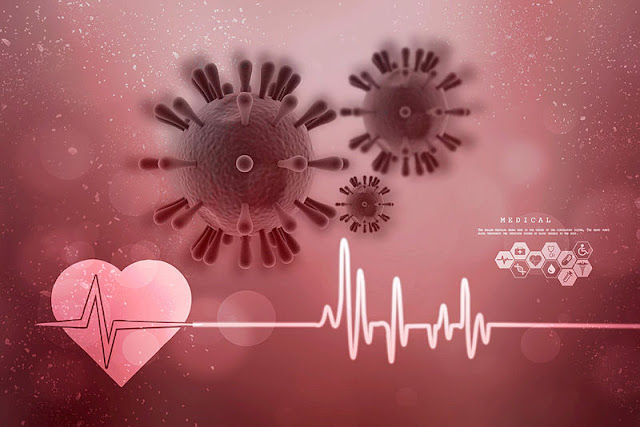Dr Ramji Mehrotra | Effects of COVID-19 on the Heart
The common understanding among laymen is that COVID-19 is just a lung disease. However, this view is not accurate. The SARS-CoV-2 virus affects the cardiovascular system also and people with high blood pressure, obesity, and diabetes are prone to severe forms of COVID-19.
Major
risk factors
Hypertension
or high blood pressure is the greatest risk factor, specifically causing 2.5
times greater risk of mortality due to COVID-19 in people over 60. High blood
glucose levels, high cholesterol, and obesity are the other risk factors.
Short
term effect of COVID-19 on the heart
During
the first few weeks after a person is infected, COVID-19 can affect the heart
with problems such as inflammation of the heart muscle and inflammation of the
membrane around the heart. According to medical research, one in four people
hospitalized with COVID-19 suffer heart damage.
SARS-COV-2
virus binds to the body's ACE2 receptors which help in regulating processes
such as inflammation and blood pressure. Hence, patients with heart disease and
other cardiovascular risk factors need to be careful to avoid complications
like constriction of arteries and high blood pressure, says dr ramji mehrotra.
Symptoms
among people affected by COVID-19
Patients
generally complain of cardiovascular symptoms like chest pain and palpitations
along with neurological symptoms like headaches, numbness, brain fogginess,
etc.
According
to doctors, these symptoms share similarities with cardiovascular diseases like
postural orthostatic tachycardia syndrome (POTS) which is characterized by an abnormal
increase in heart rate and leads to dizziness and fainting.
COVID
related cardiometabolic syndrome
According
to dr ramji mehrotra, researchers in the US have identified a new
COVID-related cardiometabolic syndrome. This has been found in patients with
high body fat, diabetes, high blood pressure, and high cholesterol. These four
factors can cause people with COVID-19 to experience blood clotting and poor
immune function.
According
to the researchers, due to the unexpected cardiovascular vulnerabilities, there
is a need to improve cardiometabolic health at the global level.
Long-term
effects on the heart
COVID-19
can cause lingering effects such as fatigue and breathlessness though data on
the long-term cardiovascular impact is limited currently.
Though
most of the patients with COVID-19 recover completely, possible long-term risks
for survivors remain. Researchers have discovered evidence of ongoing heart
dysfunction in recovered COVID-19 patients.
While
fatigue, chest pain, and joint pain are some of the persistent symptoms, according
to a research paper 78 percent of recovered patients had abnormalities in the
heart and 60 percent had ongoing myocardial inflammation.
The
amount of damage inflicted upon the heart varies according to a patient’s
immune response, infecting dose of virus, and comorbidities if any. Though the
risk is higher in patients with underlying heart issues, it has been observed
that even healthy people have been affected by heart damage after recovering
from COVID-19.
Conclusion
Considering
the significant damage that COVID-19 can cause to the heart, people with any
preexisting heart conditions should make healthy lifestyle changes like regular
exercise, proper sleep, and avoiding smoking and tobacco. This will minimize any
complications in case they are affected by COVID-19.



Comments
Post a Comment